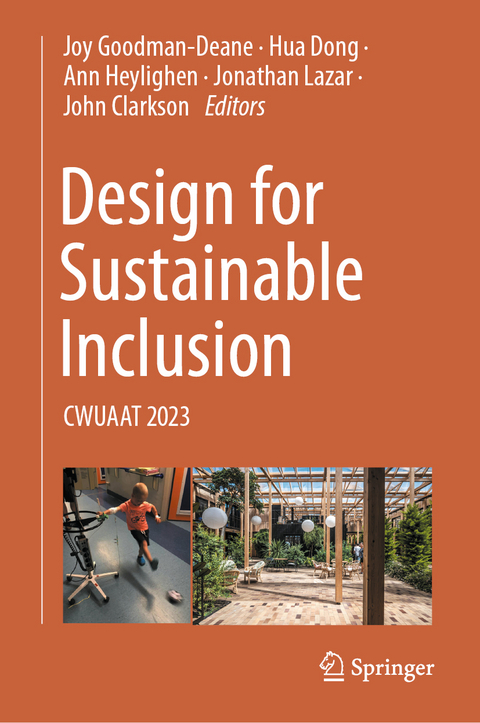
Design for Sustainable Inclusion
Springer International Publishing (Verlag)
978-3-031-28527-1 (ISBN)
This book, Design for Sustainable Inclusion, was inspired and informed by the United Nations Sustainable Development Goals. These include, among others, 'good health and well-being', 'reduced inequalities' and 'sustainable cities and communities'. Addressing this challenge requires a cross-disciplinary approach and close collaboration with many stakeholders. The Cambridge Workshop on Universal Access and Assistive Technology (CWUAAT) 2023 invited participants from a wide variety of disciplines to contribute to the discussion on this topic.
This book represents the papers presented at this conference, chosen by peer review by an international panel of currently active researchers. The chapters within the book provide a unique insight into current national and international research in the fields of inclusive design, universal access, and assistive and rehabilitative technology. The main sections of the book reflect the following key themes:
-Understanding people
-Designing for an ageing population
-Inclusive built environments
-Healthcare
-Assistive technology
-Design methods-Education and training
We hope that this book will be useful to researchers, teachers, students and the general public who are interested in inclusive design and sustainable development.
lt;p>Joy Goodman-Deane is Senior Research Associate in the Inclusive Design group at the EDC. She gained a Ph.D. in Computing Science from Glasgow University in 2002 and worked as Research Associate there investigating the design of computer-based technology for older people. For the last 18 years, she has worked at the Engineering Design Centre (EDC) at the University of Cambridge where her research has focused on inclusive design. Her interests focus on developing tools and methods to help support designers in putting inclusive design into practice. Joy helped to develop and author the Inclusive Design Toolkit as well as tools such as the Exclusion Calculator, Cambridge impairment simulators, and digital personas.
Part 1: Understanding People.- Chapter 1: Understanding Real People: Going Beyond Single Severe Capability Loss.- Chapter 2: Inclusivity Requirements for Immersive Content Consumption in Virtual and Augmented Reality.- Chapter 3: Low-Carbon to Older Chinese Migrants: Theoretical Models.- Part 2: Designing for an Ageing Population.- Chapter 4: Engagement Towards Creating New Models for Later Life Living.- Chapter 5: Promoting Physical Activity to Older Adults Using Different Ageing Models.- Chapter 6: The Effect of Socio-Cultural Determinants on Designing Inclusive Telemedicine Tools for the Aging Population.- Chapter 7: Proposing a Systematic Assessment Tool for Evaluating the Architectural Variables of Dementia-friendly Design in Nursing Homes.- Part 3: Inclusive Built Environments.- Chapter 8: Reframing Independent Living: Co-producing Homes to Age-in-place.
| Erscheinungsdatum | 25.03.2023 |
|---|---|
| Zusatzinfo | XIV, 224 p. 52 illus., 37 illus. in color. |
| Verlagsort | Cham |
| Sprache | englisch |
| Maße | 155 x 235 mm |
| Gewicht | 517 g |
| Themenwelt | Technik ► Maschinenbau |
| Schlagworte | Architectural Inclusion • Assistive Technology • automotive engineering • Governance and Policy of Inclusion • Human-Computer interaction • inclusive design • Rehabilitation Engineering • universal accessibility |
| ISBN-10 | 3-031-28527-1 / 3031285271 |
| ISBN-13 | 978-3-031-28527-1 / 9783031285271 |
| Zustand | Neuware |
| Haben Sie eine Frage zum Produkt? |
aus dem Bereich


